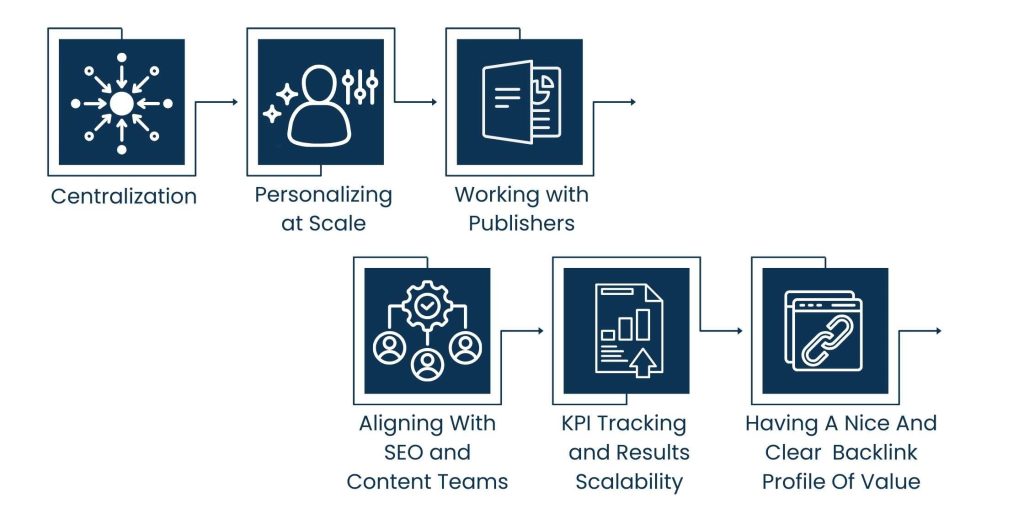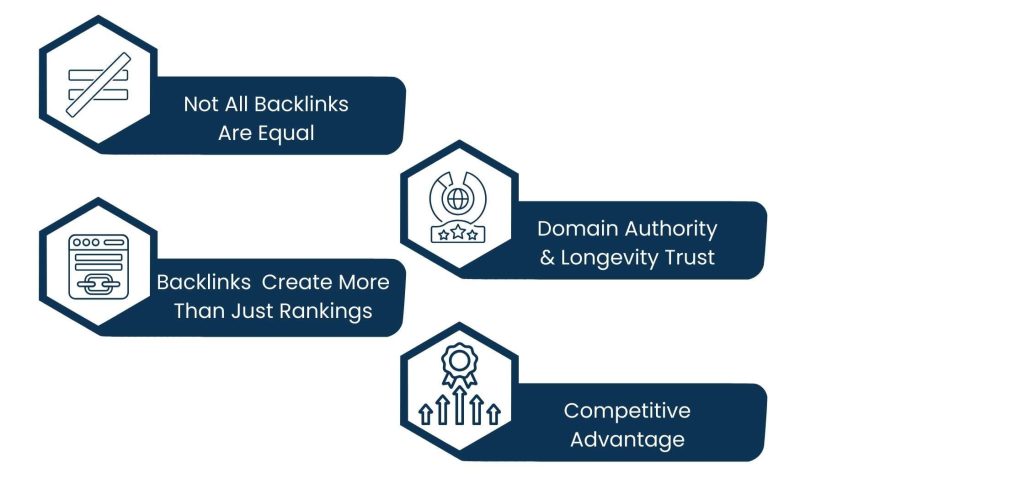Introduction
Expanding backlink outreach sounds easy in theory, until you sit down to do it. Researching prospects and personalizing emails, along with tracking performance and managing follow-ups, link-building soon becomes overwhelming. It’s not just a matter of volume; it’s a matter of being consistent, creative, organized, and having a reliable product while making dozens of pieces juggle.
This is where a Backlink Manager comes into play. Their role has become increasingly crucial for SEO and content marketing teams looking to develop the site authority in an organized, repeated, and sustainable manner. It’s more than an outreach management tool, it’s system management too. They build workflows, nurture publisher relationships, check the health of links, and ensure each campaign supports wider SEO aims.
An outreach manager handles all the off-page SEO projects for you. He is the one who makes strategies for SEOs, leads content teams, and earns valuable links. In this post, we’re going into detail on how they work and why your organization may need one.
Outreach Strategies and Tools
As outreach expands, so does the complexity, and without structured planning, things go uncontrolled. A Backlink Manager organizes the process thoroughly by establishing and maintaining a centralized outreach system. They own your outreach playbook; the messaging, who you’re outreaching, how many follow-ups are being sent, and what’s in the content promoted.

1. Centralization
Instead of allowing unlinked team members to dispatch misaligned pitches, the Link-Building specialist centralizes communication via templates, stores contact history, and guarantees to approach prospects at the right time with the ideal tone. On the outreach front, you need a single system for outreach, like BuzzStream, Pitchbox, or even a well-organized CRM, to eliminate guesswork and time sinks.
This centralized approach enhances efficiency, and a smarter workflow can expand without sacrificing quality. Everyone involved in the process is aware of who’s working on what, which campaigns are being run, and how potential customers are moving through their outreach pipeline.
Bottom line: When it comes down to it, the Backlink Manager makes loose outreach a progressive, measurable campaign.
2. Personalizing at Scale
One of the most tedious parts of backlink outreach is determining how much personalization and efficiency is required. Mass emails can reach hundreds of addresses, but they won’t be as effective as high-quality backlinks. That’s where an experienced Link Strategy Coordinator excels; they’ve figured out how to personalize outreach at scale while maintaining relevance and quality.
Instead of launching the same pitch to the same prospects, the Backlink Manager helps you build targeted outreach lists organized by industry, content, and domain authority. From there, they customize messaging just to that group, reiterating why the content being pitched is relevant to such-and-such publisher or blog.
They also monitor which types of subject lines or formats, or angles, are most appealing to each segment, and adjust accordingly for future campaigns. They write every message with care, even if it’s part of a larger campaign.
The result? Fewer ignored emails, better open rates, and more meaningful conversations with link prospects. Or, that is, better links with less noise, and a process that actually scales.
3. Working with Publishers
Backlinks’ success is not just a function of outreach, it’s ultimately an outcome of relationships. A great Backlink Manager will know that the editors, bloggers, and site owners who are linking to your page aren’t just link sources… they’re long-term partners in your off-page SEO strategy. They don’t see outreach as just a one-time connection; they evolve and maintain relationships with publishers.
They support detailed lists of past engagements: who linked to your page, what kind of pitches they responded to, and any preferences or feedback they’ve shared on previous interactions. This also leads to more considered follow-ups and repeat collaborations (which are far more effective and efficient than cold pitching each time).
Backlink Managers also check the quality of these relationships. They’ll flag when a publisher’s quality goes in a different direction, or a domain is no longer reputable, so you’ll never associate your brand with harmful web properties. This relationship-building also becomes an asset in its own right; you’ll unlock premium placements, guest posts, and influencer partnerships over time.
In other words, an ongoing, respectful conversation can turn a one-off reinforcement win into a steady pipeline of backlinks — and that’s where a Backlink Manager can make a lasting impact.
4. Aligning With SEO and Content Teams
A Link-building professional doesn’t exist in isolation; they play a vital role by providing a connection between your SEO strategy and the execution of content. The SEO team decides what pages need help and what keywords are most important. The content team creates the assets, but it’s the Backlink Manager who makes sure the assets get in front of the right people through targeted outreach.
They sync with the SEO leads on a consistent basis to be kept up to date on what is ranking, what is priority, what content is missing, and what new keywords are being targeted. This enables them to target their outreach to the most high-impact opportunities, such as publicizing a recently published landing page or boosting a blog post optimized around a competitive term.
Simultaneously, they cooperate with the actual content creators in the design phase, recommending topics and formats that naturally draw backlinks. This partnership guarantees that the content generated is not just relevant to the readers but also useful for outreach.
While walking the fine midway line between black hat and white hat, you maintain off-page SEO strategy, and you can always make sure your backlinks are in line with the SEO plans.
5. KPI Tracking and Results Scalability
One of the true benefits of having an Off-Page SEO Strategist such as this on your team is their ability to track what’s working and what isn’t. Outreaching without data is just a guessing game, but a Backlink Manager is a system for focusing on and organising KPIs across every campaign.
This includes keeping an eye on response rates, placement success, referring domain quality, trends in domain authority, as well as anchor text distribution. Even more importantly, they translate those metrics into actionable takeaways: What outreach angles bring more links? What content resonates with higher-authority linking domains? What industries are most interesting at the moment?
This performance data doesn’t land in a spreadsheet; it instructs the next wave of outreach. It enables your team to double down on what’s working and pivot away from what’s not. It also provides SEOs and marketers with better visibility into ROI when it comes to link building.
Where analytics meets expertise, a Backlink Manager scales link acquisition intelligently and sustainably, turning short-term gains into repeatable long-term successes.
6. Having A Nice And Clear Backlink Profile Of Value
Scalability in outreach also carries risks, particularly when you can develop links from hundreds of domains. Backlinks don’t all become better with age, nor do the publishers. That’s what makes one of the most underappreciated roles of a Backlink Manager: watching your profile and ensuring that it stays clean and in line with what Google is expecting today.
The tool periodically checks the backlinks for these requests by checking links with tools such as Ahrefs, SEMrush, or Google Search Console. They monitor anchor text variation, link do follow and no follow, domain authority, and spam scores. When they find links that are toxic or spammy, they mark them for review or reject the process, as appropriate.
And they keep an eye out for once-earned links that vanish because of website updates or broken pages, following up with publishers to reintroduce them. This ongoing relationship maintenance will mean that you don’t see any drop in your SEO results as a result of outreach gone bad.
So, outreach might earn you a backlink, but maintenance is what allows that link to continue benefiting you.
Why Backlinks Are Still Important for SEO?
Backlinks continue to be one of the strongest ranking signals in Google’s search algorithm. Want to rule the SERPs and convince even the coldest of search engines that you’re the master of your domain? Some things have changed about search engines, but the main idea stays the same: when reputable sites link to your page, it’s a vote of trust, authenticity, and authoritativeness. This directly contributes to better search rankings, especially in crowded sectors.

1. Not All Backlinks Are Equal
A handful of high-domain-authority backlinks from topical websites could be more valuable than dozens of backlinks from spammy websites. Google is concerned about the context and the trust, not only the volumes. Backlinks help search engines figure out how pages are related and what one page should rank higher than another.
2. Backlinks Create More Than Just Rankings
In addition to SEO, backlinks can also generate referral traffic. When someone clicks from a blog post or news article, that visitor is usually highly engaged, they’re already interested in your niche or offering. These users convert more and retain longer.
3. Domain Authority & Longevity Trust
Backlinks contribute to domain authority (DA), a metric that illustrates how likely your site is to rank high in search engine results. DA isn’t a direct ranking factor, but it affects how both search engines and industry partners view your site.
4. Competitive Advantage
In competitive markets, backlinks frequently determine who will get page 1 rankings. A powerful backlink profile promotes faster indexing and more efficient keyword performance, in addition to higher long-term stability from algorithm updates.
In other words, if you’re looking to be competitive and to grow your website organically, backlinks are not something you have the option to consider in terms of your marketing strategy, instead, they should form the foundation of it. An expert Backlink Manager makes sure you acquire those links on purpose and ethically, and steadily.
What Outreach Means, and Why it Matters for Link Building?
Outreach is not about sending 1,000 emails and having someone say yes. Effective outreach is about strategic, relationship-building, built on turning compelling pieces of content into powerful backlinks.

1. Research-Led Targeting
An effective outreach program starts with research. The Backlink Manager tool identifies publishers, bloggers, and site owners in the space covering your sphere of influence. They seek a contextual match, not just a high DA score.
2. Personal Pitches That Matter
Editors are overloaded with pitches. That’s why personalization is so important. Great outreach emphasizes common ground, explains why the content is applicable, and provides value, whether that’s useful information, partnership opportunities, or a new perspective.
3. Timing and Relevance Matter
Effective outreach is timely. With a smart Backlink Manager, pitches can be mapped to trends, seasonality, or topicality, helping to make a link more likely when the content is most relevant.
4. Leads and Relationship Development
The vast majority of replies do not come from your first email. You need the follow-ups, but you also need the tone and timing. We use outreach tools in a very personalized way, such as a backlink professional, to put ourselves a step ahead, without being spammy.
5. Outreach is More than Links
When it’s done right, outreach creates real partnerships, not just backlinks. Eventually, these relationships generate evergreen partnerships, guest posts, and brand mentions across credible domains.
When your outreach process is strong, link building becomes repeatable, measurable, and reputation-making, not spammy or transactional.
Conclusion: A Scalable Growth Engine Turned Out of Link Building
Link building has also altered significantly; it is no longer a stand-alone SEO activity and should now form part of a comprehensive digital growth strategy. But as your outreach increases in scale, so do the obstacles: more contacts, more content, more follow-ups, more things to track. And that’s exactly why having a Backlink Manager in your corner isn’t just advantageous, it’s a strategic move.
Backlink Manager adds order, transparency, and accountability to the link-building process. They’re doing everything from outreach and relationship building to monitoring and managing the health of backlinks and tying everything to SEO goals, turning link acquisition into a predictable and scalable process.
Beyond mere links, they also help you build relationships, driving qualified referral traffic and helping you increase search visibility in a sustainable manner.
At Tasks Expert, we have a pool of talented and experienced backlink professionals who not only create links but also make long-term relationships for sustainable growth.
So if you’re serious about growing authority, boosting rankings, and developing a backlink profile that endures, contact us to stop treating outreach as an afterthought and start managing it as a core strategy.
About Us
Tasks Expert offers top-tier virtual assistant services from highly skilled professionals based in India. Our VAs handle a wide range of tasks, from part time personal assistant to specialized services like remote it support services, professional bookkeeping service etc. Furthermore, it helps businesses worldwide streamline operations and boost productivity.
Ready to elevate your business? Book a Call and let Tasks Expert take care of the rest.









